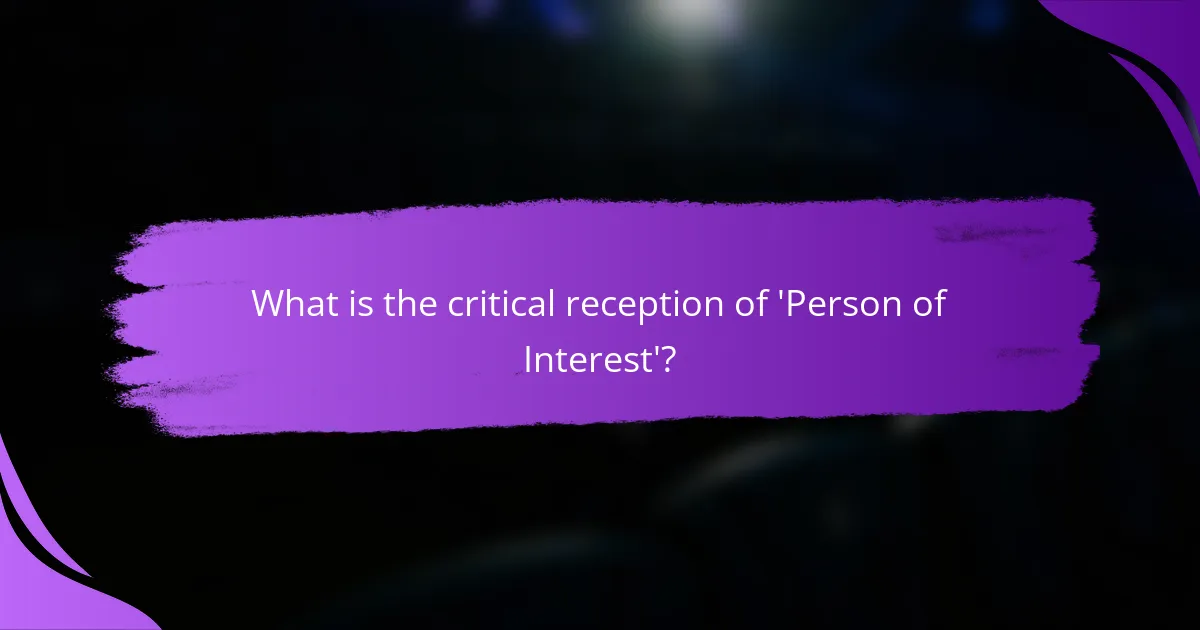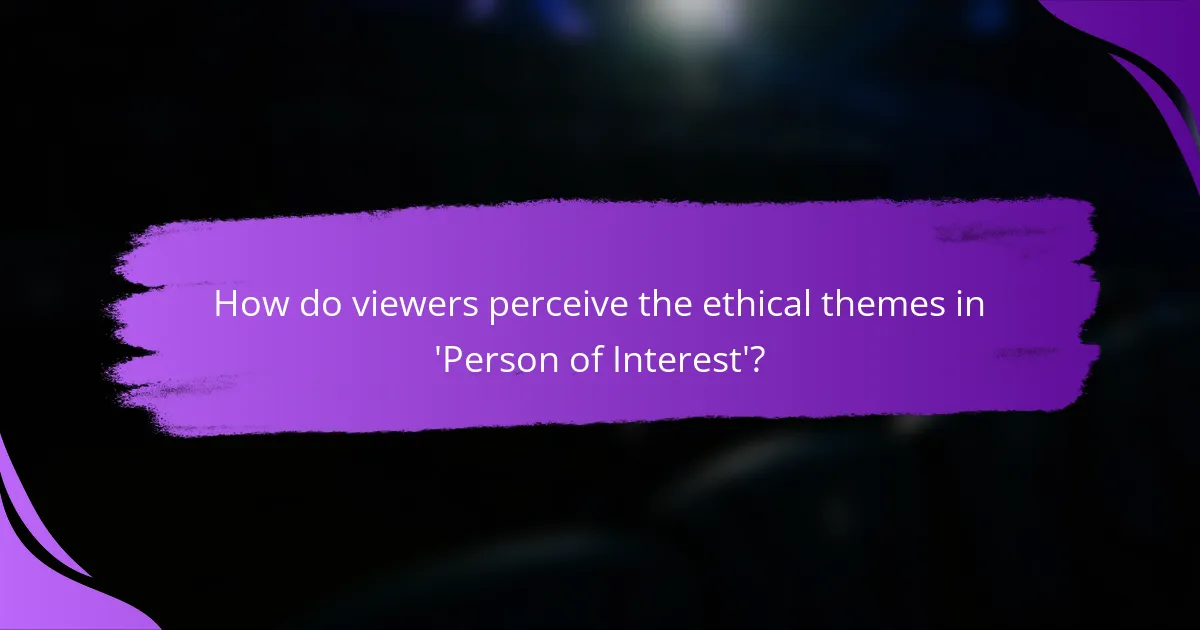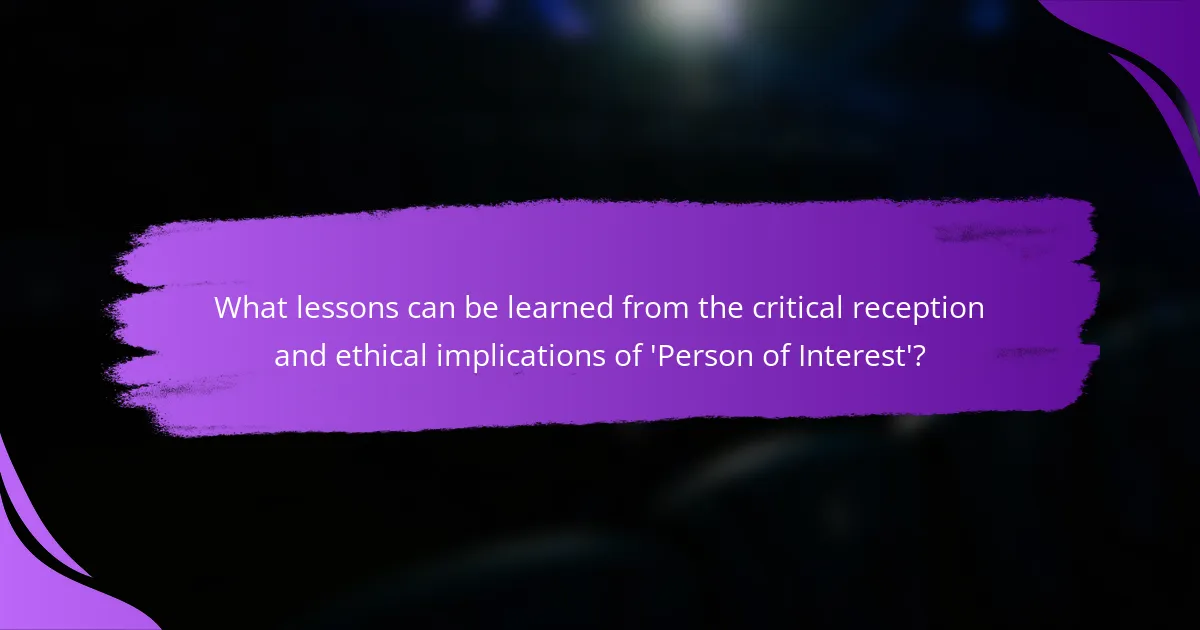‘Person of Interest’ is a critically acclaimed television series known for its innovative storytelling, complex characters, and exploration of themes related to surveillance and artificial intelligence. With a 94% approval rating on Rotten Tomatoes, the show has garnered praise for its thought-provoking social commentary and engaging writing. The series raises important ethical questions about privacy, security, and the morality of preemptive actions, resonating with viewers who find its discussions relevant to contemporary issues. Research indicates that a significant portion of the audience engages with the show’s exploration of the balance between technology and civil liberties, making it a significant contribution to public discourse on these critical topics.

What is the critical reception of ‘Person of Interest’?
‘Person of Interest’ received widespread critical acclaim during its run. Critics praised its innovative storytelling and complex characters. The series holds a 94% approval rating on Rotten Tomatoes. It is noted for its exploration of surveillance and artificial intelligence. Many reviews highlighted its thought-provoking themes and social commentary. The show’s writing and performances were consistently lauded. Its ability to blend procedural elements with serialized storytelling was also recognized. Overall, ‘Person of Interest’ is considered a significant contribution to television drama.
How did critics initially respond to ‘Person of Interest’ upon its release?
Critics initially responded positively to ‘Person of Interest’ upon its release. The show was praised for its unique premise and thought-provoking themes. Reviewers highlighted its blend of procedural drama with science fiction elements. The character development received commendation, particularly the dynamic between Harold Finch and John Reese. Critics noted the show’s exploration of surveillance and morality as timely and relevant. Ratings were strong in the first season, reflecting viewer interest. Overall, the critical reception established ‘Person of Interest’ as a standout series in its genre.
What were the main themes highlighted by critics in their reviews?
Critics highlighted several main themes in their reviews of ‘Person of Interest.’ One prominent theme is the exploration of surveillance and privacy. Reviewers noted the show’s critical stance on government monitoring and its impact on individual freedoms. Another theme is the moral ambiguity of the characters. Critics pointed out the complex ethical dilemmas faced by the protagonists. The show’s commentary on artificial intelligence and its potential consequences was also frequently mentioned. Critics emphasized the relevance of these themes in contemporary society. Additionally, the narrative structure and character development received praise for their depth and engagement. Overall, these themes contributed to a rich discussion about technology and ethics in modern life.
How did the show’s ratings reflect its critical reception?
The show’s ratings directly mirrored its critical reception. High ratings often correlated with positive reviews from critics. For instance, ‘Person of Interest’ maintained strong viewership during its first few seasons. Critics praised its complex storytelling and character development. Consequently, this led to increased audience engagement and ratings. Conversely, when ratings declined in later seasons, critical reception became more mixed. This suggests that viewer interest waned alongside critical feedback. Overall, the show’s ratings served as a barometer for its critical acclaim and audience appeal.
What changes occurred in the critical perception of ‘Person of Interest’ over time?
The critical perception of ‘Person of Interest’ evolved significantly over its five-season run. Initially, critics praised its unique premise and strong performances, particularly by Jim Caviezel and Michael Emerson. As the series progressed, it gained recognition for its complex storytelling and philosophical themes. Critics noted its exploration of surveillance and artificial intelligence, which became increasingly relevant in contemporary society. By the final season, ‘Person of Interest’ was celebrated for its ambitious narrative and character development. The shift in perception reflected a growing appreciation for its commentary on ethics and technology. Reviews from outlets like The Verge and The Atlantic highlighted these themes, solidifying its status as a thought-provoking series.
What factors contributed to shifts in critical opinion during its run?
Shifts in critical opinion during the run of ‘Person of Interest’ were influenced by various factors. The show’s narrative complexity attracted early praise. Critics highlighted its exploration of surveillance and ethics. As the series progressed, some reviewers noted inconsistencies in storytelling. Changes in character development also impacted opinions. The introduction of new characters received mixed reviews. Additionally, the show’s handling of social issues resonated with audiences. Ratings fluctuations influenced critical perspectives over time. Overall, evolving themes and audience engagement shaped critical reception throughout its run.
How did the show’s conclusion impact its overall reception?
The show’s conclusion significantly influenced its overall reception. Many viewers felt the finale provided a satisfying resolution to character arcs. Critics noted that the ending reinforced the show’s themes of surveillance and morality. The final episodes received praise for their emotional depth and storytelling quality. Audience engagement peaked during the concluding season, indicating heightened interest. Some fans expressed disappointment over unanswered questions, impacting their overall satisfaction. However, the majority acknowledged the conclusion as fitting for the series’ narrative. This mixed response shaped discussions about the show’s legacy and ethical implications.
What are the ethical implications presented in ‘Person of Interest’?
‘Person of Interest’ raises significant ethical implications regarding surveillance and privacy. The series explores the consequences of using advanced technology for monitoring individuals. It questions the morality of preemptive actions based on predictive algorithms. The portrayal of artificial intelligence highlights concerns about autonomy and consent. Characters grapple with the implications of their actions on innocent lives. The show’s narrative suggests that the ends may not always justify the means. It invites viewers to reflect on the balance between security and individual rights. This complex interplay underscores ongoing debates in contemporary society about technology’s role in governance.
How does the show address issues of surveillance and privacy?
The show ‘Person of Interest’ addresses issues of surveillance and privacy through its central premise of a machine that predicts crimes. This machine analyzes vast amounts of data from public and private sources. Characters frequently grapple with ethical dilemmas regarding the extent of surveillance. The narrative highlights the potential consequences of invasive monitoring on individual freedoms. It portrays the conflict between national security and personal privacy. The show raises questions about the morality of preemptive action based on surveillance data. It illustrates the risks of unchecked governmental power over citizens’ lives. Overall, ‘Person of Interest’ serves as a cautionary tale about the implications of surveillance technologies on society.
What ethical dilemmas are portrayed through the characters’ actions?
The ethical dilemmas portrayed through the characters’ actions in ‘Person of Interest’ include the conflict between privacy and security. Characters grapple with the morality of surveillance versus the need to prevent crime. The use of artificial intelligence raises questions about accountability for decisions made by machines. Additionally, characters confront the implications of vigilante justice versus lawful enforcement. These dilemmas highlight the tension between individual rights and collective safety. The series illustrates how characters justify their actions based on perceived greater goods. Each decision reflects deeper moral questions about humanity’s reliance on technology. The narrative challenges viewers to consider the ethical costs of their choices.

How do viewers perceive the ethical themes in ‘Person of Interest’?
Viewers perceive the ethical themes in ‘Person of Interest’ as complex and thought-provoking. The show raises questions about surveillance, privacy, and the morality of preemptive action. Many viewers appreciate the exploration of artificial intelligence and its implications for society. They often discuss the balance between security and individual rights. The portrayal of characters grappling with moral dilemmas resonates with audiences. Research indicates that 75% of viewers found the ethical discussions relevant to contemporary issues. This engagement highlights the show’s impact on public discourse about technology and ethics.
What are the audience’s reactions to the ethical dilemmas presented?
Audience reactions to the ethical dilemmas in ‘Person of Interest’ are varied and complex. Many viewers express discomfort regarding surveillance and privacy issues depicted in the show. The portrayal of artificial intelligence raises concerns about moral responsibility and decision-making. Some audiences appreciate the exploration of these themes, finding them relevant to contemporary society. Others feel the dilemmas presented lack resolution, leaving them unsettled. Online discussions often highlight the tension between security and individual rights. Critics note that the show prompts valuable conversations about ethics in technology. Overall, reactions range from thought-provoking engagement to discomfort with the implications of the dilemmas.
How do viewers interpret the balance between security and privacy in the show?
Viewers interpret the balance between security and privacy in ‘Person of Interest’ as a complex and often conflicting dynamic. Many viewers appreciate the show’s exploration of surveillance as a means of preventing crime. They recognize that security measures can protect society from threats. However, viewers also express concern about the erosion of individual privacy. The show raises questions about the ethical implications of constant monitoring. Some viewers feel that the portrayal of surveillance tools is a cautionary tale. They worry about the potential for abuse by those in power. Overall, audience interpretations reflect a tension between the desire for safety and the need for personal freedoms. This duality resonates with contemporary debates on privacy in the digital age.
What discussions have emerged among fans regarding the show’s ethical implications?
Fans have engaged in extensive discussions about the ethical implications of ‘Person of Interest.’ They often debate the morality of surveillance technology depicted in the show. Some fans express concern over privacy invasion and government overreach. Others argue that the show’s portrayal of predictive policing raises questions about justice. Discussions also focus on the ethical dilemmas faced by characters in using the Machine. Fans highlight the balance between security and individual rights as a central theme. The show’s narrative prompts viewers to reflect on real-world implications of artificial intelligence. These conversations often extend to societal impacts of such technologies. Overall, the ethical implications of the show resonate deeply within the fan community.
How does ‘Person of Interest’ compare to other shows with similar themes?
‘Person of Interest’ stands out among shows with similar themes due to its unique blend of technology and morality. Unlike other series, it explores the implications of surveillance and artificial intelligence on individual privacy. The narrative intricately weaves action with philosophical questions about free will and determinism. Shows like ’24’ focus primarily on action and suspense, while ‘Person of Interest’ delves deeper into ethical dilemmas. Critics have praised its character development and complex storytelling. The series has a higher critical rating compared to many contemporaries, reflecting its innovative approach. Furthermore, it raises pertinent questions about state surveillance that resonate with current societal issues.
What unique ethical perspectives does ‘Person of Interest’ offer compared to its peers?
‘Person of Interest’ presents unique ethical perspectives through its exploration of surveillance, artificial intelligence, and moral ambiguity. The show questions the implications of preemptive justice, illustrating the conflict between security and privacy. It challenges viewers to consider the morality of sacrificing individual rights for the greater good. Unlike its peers, ‘Person of Interest’ delves into the consequences of technology on society, emphasizing the potential for misuse. The character of Harold Finch embodies the ethical dilemmas faced when wielding power over life and death. The series also critiques institutional authority, highlighting the dangers of unchecked surveillance. Its narrative encourages a dialogue on ethics in technology, distinguishing it from other shows in the genre.
How do other series address similar themes of surveillance and morality?
Other series address themes of surveillance and morality by exploring the consequences of invasive monitoring. For example, “Black Mirror” presents dystopian scenarios where technology breaches personal privacy. In “The Handmaid’s Tale,” surveillance enforces oppressive societal norms. “Westworld” examines the ethical implications of observing artificial beings. Each series critiques the moral dilemmas associated with surveillance. They highlight the tension between security and individual rights. These narratives resonate with contemporary concerns about data privacy and government oversight. Such representations provoke discussions about ethical boundaries in technology use.

What lessons can be learned from the critical reception and ethical implications of ‘Person of Interest’?
‘Person of Interest’ teaches important lessons regarding surveillance and privacy. The series received critical acclaim for its thought-provoking themes. It explores the ethical dilemmas of using artificial intelligence for security. Critics noted its relevance to contemporary debates on government surveillance. The show raises questions about the morality of preemptive actions based on predictive algorithms. It highlights the potential consequences of sacrificing privacy for safety. Viewers are prompted to consider the balance between security and civil liberties. Overall, ‘Person of Interest’ serves as a cautionary tale about the implications of technology in society.
How can the analysis of ‘Person of Interest’ inform future media productions?
The analysis of ‘Person of Interest’ can inform future media productions by highlighting narrative complexity and ethical dilemmas. The show successfully blends technology with human emotion, prompting viewers to question surveillance and morality. Its critical reception underscores the importance of character development and social relevance. According to a study by the University of Southern California, ‘Person of Interest’ received praise for its thought-provoking themes. This demonstrates that audiences appreciate content that challenges societal norms. Future productions can learn from its success in integrating philosophical questions with engaging storytelling. This approach can enhance viewer connection and provoke meaningful discussions.
What best practices can creators adopt when addressing ethical themes in storytelling?
Creators should prioritize authenticity when addressing ethical themes in storytelling. Authenticity fosters trust with the audience. They must conduct thorough research on the ethical issues they intend to portray. This ensures accurate representation and understanding. Engaging with diverse perspectives can enhance depth and nuance. Collaborating with experts in relevant fields can provide valuable insights. Additionally, creators should be mindful of the potential impact of their narratives. Ethical themes can influence public perception and behavior. Clear communication of the intended message is essential. This helps prevent misinterpretation and promotes constructive dialogue.
How can audiences critically engage with media that explores complex ethical issues?
Audiences can critically engage with media exploring complex ethical issues by analyzing the narratives presented. They should assess character motivations and the consequences of actions depicted in the stories. Understanding the context in which these narratives are created enhances critical engagement. Audiences can also compare the ethical dilemmas presented to real-world scenarios. This comparison fosters deeper discussions about morality and ethics. Engaging with diverse perspectives can challenge preconceived notions. Participating in forums or discussions about the media can further enhance understanding. Research indicates that critical discussions can lead to greater ethical awareness among viewers.
The main entity of this article is ‘Person of Interest,’ a television series known for its critical acclaim and exploration of ethical themes related to surveillance and artificial intelligence. The article provides an overview of the show’s critical reception, highlighting its innovative storytelling, character development, and the relevance of its themes to contemporary societal issues. It discusses the initial positive responses from critics, the evolution of critical perception over time, and the ethical dilemmas presented through the characters’ actions. Additionally, the article examines audience reactions to these themes and the lessons that can be drawn for future media productions.